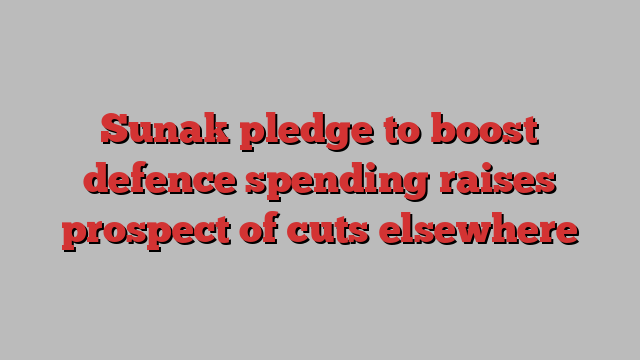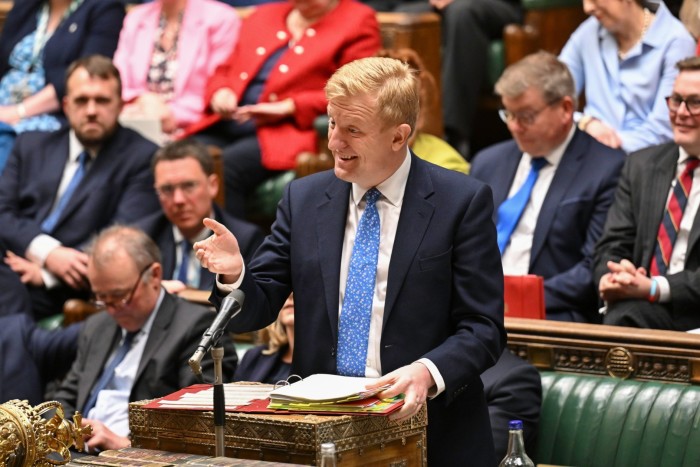
Unlock the Editor’s Digest for free
Roula Khalaf, Editor of the FT, selects her favourite stories in this weekly newsletter.
Rishi Sunak has claimed he can protect public services and reduce taxes while boosting defence spending by £75bn over the next six years, raising the prospect of deep cuts to unprotected government departments.
The UK prime minister told a press conference in Berlin on Wednesday that his prioritisation of defence — following his pledge this week to raise expenditure to 2.5 per cent of national income on it by 2030 — would not hit investment in the NHS and schools, but he did not rule out real-term cuts elsewhere.
Sunak insisted his defence spending commitment was “a completely funded plan”, highlighting the government’s proposal to cut around 70,000 civil service jobs, which officials say would free up £2.9bn a year by 2028-29 for defence.
Standing alongside German chancellor Olaf Scholz, Sunak said that on top of higher defence spending, the UK would “continue to invest in public services and cut people’s taxes”.
Officials said that more of the government’s research and development budget would be apportioned to the Ministry of Defence to boost the department’s expenditure by another £1.6bn a year.
The government estimates that getting military spending to 2.5 per cent of gross domestic product from its current baseline of 2.3 per cent of GDP will cost an extra £4.5bn a year by 2028-29.
Sunak said defence would receive an additional £75bn over six years. But the calculation is based on the sum of annual spending increases, and an assumption — questioned by economists — that expenditure would otherwise have been frozen in cash terms. Labour called it a “fake figure”.
By 2030-31 the defence budget is anticipated to be £7bn a year higher than now, and the further expenditure to reach that level has not been funded.
The government has not signalled how it will find the missing £2.5bn between that £7bn and the extra £4.5bn a year, although ministers have vowed that none of the increase will come from borrowing or debt.
However, economists have warned that the plan is likely to entail deep cuts to public services in unprotected departments, including areas such as prisons, courts and local government.
Ben Zaranko, at the Institute for Fiscal Studies think-tank, said cuts to the civil service and a larger portion of the R&D budget “won’t be enough” to fund the defence spending pledge to 2030.
“Ministers want to spend more on defence, but they don’t want to spend any more overall. Those areas already facing cuts are now facing bigger cuts as a result of this pledge. There’s no willingness to engage with that by the government,” Zaranko said.
He added: “My estimate is unprotected departments will now face cuts of about 4 per cent a year — that’s two-thirds of the rate that [former chancellor] George Osborne cut those departments by in the 2010s. It’s in the ballpark of full-throttle austerity.”
Torsten Bell, chief executive of the Resolution Foundation think-tank, said the government’s claim that the defence pledge was fully funded was “a joke”.
He argued on X that even delivering the current baseline spending on defence of 2.3 per cent of national income in the next parliament would “require even deeper cuts to other department[s]”.
Labour leader Sir Keir Starmer confirmed earlier this month that he shared Sunak’s ambition to raise defence spending to 2.5 per cent, but has declined to match the prime minister this week by agreeing to hit the target by a specific date.
John Healey, shadow defence secretary, said that if Labour won the general election, expected later this year, it would conduct a review within its first year in office to assess the state of the armed forces, national security threats and the resources required for defence.

In the House of Commons on Wednesday Oliver Dowden, deputy prime minister, accused Labour of having “no plans in a dangerous world”.
In a flavour of the attacks the Tories are poised to deploy in the upcoming election campaign, Dowden accused his Labour counterpart Angela Rayner of having “voted to scrap Trident” and of backing former party leader Jeremy Corbyn “who wanted to change the army into a peace corps”.
Rayner hit back: “We all want to see 2.5 per cent [of GDP spent on defence]. The difference is, we haven’t cut the army to its smallest size since Napoleon.”
BAE Systems, Britain’s leading defence group and key supplier of ammunition to the UK’s armed forces, is expected to be among the biggest beneficiaries of increased spending.
The government has pledged to invest at least an additional £10bn over the next decade on increasing domestic munitions production. BAE last year secured new orders worth up to £400mn to raise output capacity of key 155mm artillery shells eight-fold.
Additional reporting by Sylvia Pfeifer

